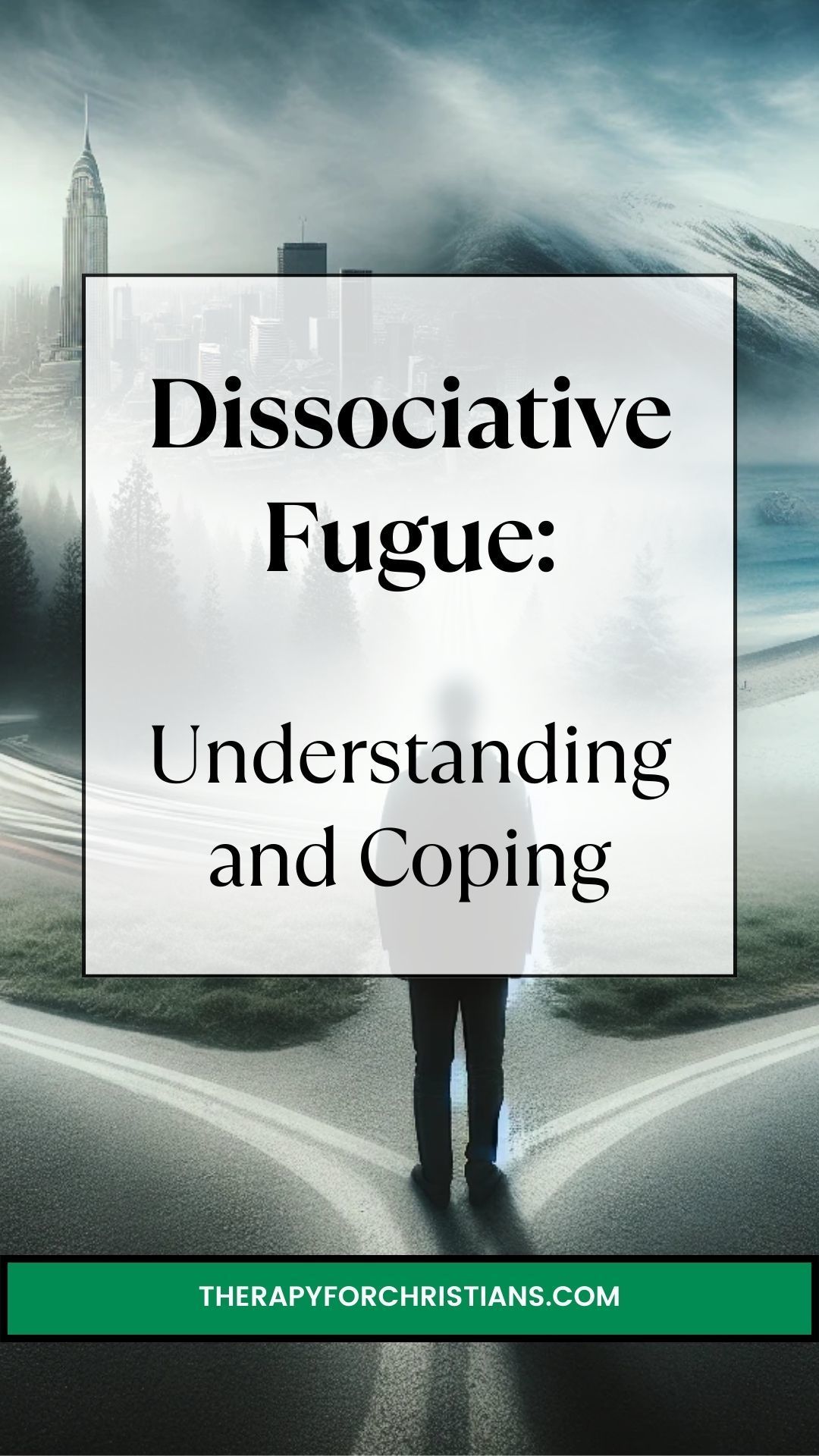

Imagine waking up one day in an unfamiliar place, with no recollection of how you got there or even who you are. This unsettling phenomenon, known as dissociative fugue, is a rare and often misunderstood psychiatric condition. In this blog post, we will unravel the mysteries surrounding dissociative fugue, shedding light on its causes, symptoms, and treatment options. By understanding this disorder, we can better support those affected and help them regain control of their lives.

Exploring Dissociative Fugue
Dissociative fugue, also known as psychogenic fugue, is a subtype of dissociative amnesia characterized by sudden, unexpected travel away from one’s usual environment, memory loss, and the potential establishment of a new identity. Despite its rarity, affecting only 0.2% of the global population, fostering awareness and understanding of dissociative fugue disorder can help support affected individuals.
This enigmatic condition is connected to other dissociative disorders, such as dissociative identity disorder and dissociative amnesia. However, dissociative fugue stands apart due to its unique combination of memory loss, sudden travel, and the possible formation of a new identity. The upcoming sections will provide a detailed analysis of the defining characteristics, symptoms, causes of dissociative fugue, and an overview of different treatment and recovery strategies.)-(1).jpg)
Defining Dissociative Fugue
Dissociative fugue is characterized by:
A temporary loss of memory
Often accompanied by a sudden and unplanned journey away from home or work
Individuals experiencing this disorder may appear normal but struggle to recall their past or recognize their true identity
The Diagnostic and Statistical Manual of Mental Disorders, Fifth Edition (DSM-5), classifies dissociative fugue as a subtype of dissociative amnesia, distinguishing it from other forms of amnesia.
The primary characteristics of dissociative fugue include:
Amnesia
Confusion
A sudden absence from work or avoidance of familiar places
An unexpected journey away from home
These symptoms may manifest in various ways, such as memory loss, disorientation, and feelings of detachment from oneself and emotions.
Relation to Other Dissociative Disorders
Dissociative fugue is closely related to other dissociative disorders, such as dissociative identity disorder and dissociative amnesia. In the DSM-5, dissociative fugue is classified as a subtype of dissociative amnesia, emphasizing its distinct features of memory loss and sudden travel.
Despite its infrequency, dissociative fugue exhibits similarities with other dissociative disorders in symptomatology and potential triggers. Traumatic events or reminders of past trauma often cause these disorders, which highlights the need for mental health professionals to understand their unique manifestations and challenges for effective diagnosis and treatment.
Recognizing Symptoms of Dissociative Fugue

Recognizing the symptoms of dissociative fugue can be challenging, as they may not be immediately apparent to others. During a fugue state, individuals may exhibit:
Sudden travel
Memory loss
Confusion
Difficulty recognizing familiar people or places
Once the fugue state ends, they may experience feelings of distress, depression, or even shame.
The upcoming sections will focus on the manifestations of dissociative fugue during and after the fugue state.
Manifestations During the Fugue State
During the fugue state, an individual may experience the following:
Seeming perfectly normal but struggling to remember their past or recognize their true identity
Traveling unexpectedly to unfamiliar places
Establishing a new identity in the process
Experiencing temporary loss of memory
Feeling confusion and disorientation
The memory loss experienced during a fugue state can be quite profound, affecting both personal and general memories. Individuals may be unaware of these gaps in their memory until presented with evidence that they cannot recall certain information. Such an unsettling experience can lead to distress, underlining the need for professional intervention and support.
Post-Fugue State Symptoms
After the fugue state ends, individuals may experience a range of emotions, including confusion, distress, and memory gaps related to the episode. The sudden return of memories and awareness of the time lost during the fugue state can be overwhelming, potentially leading to feelings of uneasiness and disorientation.
For individuals experiencing distress after a dissociative fugue state, seeking professional assistance is beneficial as the underlying trauma or stress that instigated the fugue state might still be unresolved. Addressing these emotions and navigating the challenges of the dissociative episode can help individuals regain control of their lives and prevent future episodes, especially if they are dealing with post traumatic stress disorder.
Causes and Triggers of Dissociative Fugue

Dissociative fugue is often triggered by traumatic events or reminders of past trauma, such as abuse, accidents, or natural disasters. In addition to environmental factors, genetic predisposition may also play a role in the development of dissociative fugue, with some individuals being more susceptible to the condition.
The forthcoming subsections will examine the influence of trauma and genetics as potential causes and triggers of dissociative fugue.
Traumatic Events
Traumatic events are often the catalyst for dissociative fugue, as the intense stress and emotional upheaval they provoke can lead to temporary memory loss and disorientation. Examples of traumatic experiences that may trigger dissociative fugue include:
Warfare
Abuse
Accidents
Natural disasters
Loss of employment
Individuals who have experienced dissociative fugue often report feeling disconnected from their surroundings and their own identity, which can be a distressing and disorienting experience.
The severity of the extreme psychological trauma and its subsequent impact on mental health can directly affect the probability of developing dissociative fugue. Hence, mental health professionals need to give due consideration to the role of trauma in the onset of dissociative fugue and offer suitable support and intervention for those affected.
 Pin It & Save for Later!
Pin It & Save for Later!
Genetic Factors
Research indicates that there may be a genetic component to dissociative fugue, with certain individuals potentially being more susceptible to the condition. Studies have suggested a correlation between dissociative symptoms and genes associated with serotonergic, dopaminergic, and peptidergic transmission.
However, the precise genetic predisposition and its impact on the probability of developing dissociative fugue remains unclear. As such, a combination of genetic and environmental factors likely contribute to the onset of dissociative fugue, emphasizing the need for a comprehensive approach to diagnosis and treatment.
Diagnosing Dissociative Fugue

Diagnosing dissociative fugue can be a challenging process due to its rarity and the necessity for retrospective evaluation. Accurate diagnosis requires thorough:
Medical evaluation
Neurological evaluation
Psychiatric evaluation
Psychological evaluation
These evaluations are necessary to rule out other potential causes and confirm the presence of dissociative fugue.
The coming sections will discuss the diagnostic criteria and challenges associated with diagnosing dissociative fugue.
Diagnostic Criteria
The DSM-5 outlines specific criteria for diagnosing dissociative fugue, which include memory loss, sudden travel, and the establishment of a new identity. These criteria help distinguish dissociative fugue from other dissociative disorders, such as dissociative identity disorder and dissociative amnesia.
When diagnosing dissociative fugue, it is crucial to consider the unique combination of memory loss, sudden travel, and the potential formation of a new identity. By adhering to the diagnostic criteria outlined in the DSM-5, mental health professionals can accurately identify cases of dissociative fugue and provide appropriate treatment and support.

Challenges in Diagnosis
Given the complex nature of dissociative fugue and the necessity for retrospective assessment, arriving at an accurate diagnosis could be challenging. To prevent misdiagnosis, healthcare professionals must be knowledgeable about the disorder and its associated symptoms, as well as conduct a thorough medical, neurological, psychiatric, and psychological evaluation of the individual.
It is also important to consider the potential overlap between dissociative fugue symptoms and other mental health conditions, such as:
Anxiety
Depression
Conversion disorder
Schizophrenia
By employing a comprehensive diagnostic approach, a mental health professional can accurately identify dissociative fugue and provide appropriate mental health treatment and support.
Treatment Options for Dissociative Fugue

Dissociative fugue treated options aim to resolve the current episode and prevent future occurrences. This often involves a combination of therapeutic interventions, such as psychotherapy and cognitive-behavioral therapy, as well as medication management for co-occurring conditions.
The following sections will cover a variety of treatment options for dissociative fugue, including therapeutic interventions and medication management.
Therapeutic Interventions
Psychotherapy is a critical component of dissociative fugue treatment, as it helps individuals cope with the stress or trauma that initiated the fugue and provides insight into their thought processes. Talk therapy, psychotherapy, and family therapy have been found to be particularly effective in treating dissociative fugue.
In addition to traditional talk therapy, other therapeutic approaches, such as cognitive-behavioral therapy (CBT), Eye Movement Desensitization and Reprocessing (EMDR) therapy, and dialectical behavior therapy (DBT), can also be beneficial in addressing the underlying causes of dissociative fugue and promoting recovery.
Medication Management
Though there are no specific medications for dissociative fugue itself, medication management can play a role in treating co-occurring conditions, such as depression or anxiety, which may contribute to dissociative fugue episodes. Antidepressants and anti-anxiety medications may be prescribed to help manage these accompanying symptoms, providing additional support during the recovery process.
One must remember that medication management should be used in tandem with therapy and other treatment approaches for dissociative fugue. By addressing the psychological factors that may be causing the disorder, as well as any accompanying symptoms, individuals can work towards a successful recovery and prevent future episodes.
Recovery and Coping Strategies
Recovering from dissociative fugue involves a combination of self-care techniques and support from loved ones. By managing stress, practicing relaxation exercises, and engaging in therapy, individuals can address the underlying causes of their dissociative episodes and work towards a full recovery.
The upcoming sections will focus on various self-care techniques and ways family and friends can lend support during the recovery process.
Self-Care Techniques
Managing stress and practicing relaxation techniques, such as mindfulness, deep breathing, and meditation, can be beneficial for individuals coping with and preventing dissociative fugue episodes. Regular physical exercise and healthy eating habits can also contribute to overall physical and mental well-being, which can aid in managing dissociative episodes.
In addition to maintaining a healthy lifestyle, individuals with dissociative fugue should seek professional mental health support and engage in talk therapy to address the underlying stress and trauma that may have triggered the fugue. By practicing self-care and working with mental health professionals, individuals can regain control of their lives and prevent future dissociative episodes.
Support for Family and Friends
Family and friends play a vital role in supporting individuals with dissociative fugue, offering emotional support, understanding, and comfort during episodes of dissociation. By building a secure and supportive environment, they can help their loved one feel safe and open to treatment.
In addition to providing emotional support, family and friends can help with dissociative fugue in the following ways:
Identify potential triggers
Encourage their loved one to seek therapy
Work together with mental health professionals
Participate in family therapy
Strengthen the support system
Contribute to their loved one’s recovery process.
Final thoughts on Dissociative Fugue
Dissociative fugue is a rare and often misunderstood psychiatric condition characterized by sudden, unexpected travel, memory loss, and the potential establishment of a new identity. By understanding its causes, symptoms, and treatment options, we can better support those affected by this disorder and help them regain control of their lives. Recovery and coping strategies involve self-care techniques, professional mental health support, and a strong support system from family and friends. With the right treatment and support, individuals with dissociative fugue can work towards a successful recovery and prevent future episodes.
Before you leave, we would appreciate it if you helped us spread the word by sharing, tweeting, pinning, etc. this post.
About the Author:
Corine Williams, Ph.D. is Clinical Psychologist that is currently seeing clients in the States of Maryland, New Jersey, and New York. You can find out more about her practice by visiting www.therapyforchristians.com/corinewilliams. In addition to providing individual therapy, Dr. Williams is also passionate about writing books and designing merchandise that educate, uplift, and normalize mental health subject in the Christian community. You can find out more about her at www.booksbycorine.com or by visiting her amazon profile here: https://www.amazon.com/Corine-Hyman/e/B00AWZ5FL2
Help us increase mental health awareness in the Christian community by donating through our paypal link here: www.paypal.com/therapyforchristians, joining our mailing list by clicking below, or join our provider list here: Provider listing
Disclaimer: the information, including but not limited to, text, graphics, images and other material contained on this article are for informational purposes only. No material on this site is intended to be a substitute for professional medical advice, diagnosis or treatment. If you are looking for a Christian counselor near you, please check out our directory located here: Christians Therapist Near Me
.png)













